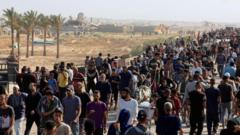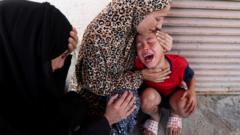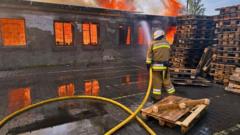The ongoing violence exacerbates the dire humanitarian situation, leaving many civilians in peril.
**Tragedy in Gaza: Children Among Victims of Air Strike as Humanitarian Crisis Deepens**

**Tragedy in Gaza: Children Among Victims of Air Strike as Humanitarian Crisis Deepens**
Emergency officials report rising casualties amidst intensified conflict in central Gaza.
In a tragic incident on Sunday, an Israeli air strike in central Gaza resulted in the deaths of ten individuals, including six children, as they awaited water distribution at a local tanker, emergency service officials have reported. The victims' bodies were transported to al-Awda Hospital in Nuseirat, where doctors confirmed that 16 others were injured, among them seven children. Eyewitnesses recounted that a drone targeted the crowd of civilians queuing with empty water containers amidst a severe water shortage in the region.
The Israeli military has not yet issued a comment regarding the attack. The International Committee of the Red Cross (ICRC) highlighted a drastic increase in casualties, noting their Rafah field hospital has treated more mass casualty cases in the past six weeks than the entire previous year combined. The Red Cross reported receiving 132 patients suffering from weapon-related injuries, with 31 succumbing to their wounds on Saturday alone.
Videos circulating online depict the aftermath of the strike, showcasing the harrowing reality faced by Gaza's civilians as they rushed to assist the injured. On the same day, additional Israeli air strikes across the Gaza Strip resulted in the deaths of 19 more Palestinians in residential areas of Gaza City and Nuseirat.
Significant numbers of casualties associated with the conflict have been recorded near aid distribution sites, which reflect the catastrophic state of security and safety in the region. The UN human rights office reported nearly 800 aid-related killings since May, exacerbated by severe shortages of food, water, and medical care due to ongoing hostilities.
Healthcare facilities are nearing collapse, as critical services are disrupted amid overwhelmed hospitals dealing with the mounting number of victims. The ICRC emphasized the urgent need for international attention, warning that the consistent attacks are inflicting horrific conditions on civilians in Gaza.
Despite the heightened violence, only a small amount of fuel was permitted into Gaza this week, a move that the UN labelled as insufficient to meet the dire needs of the population. Hospitals are struggling to maintain operations, with reports indicating that ambulances and emergency services may soon be unable to function effectively.
As Gaza's humanitarian crisis deepens, the international community faces pressing questions regarding the unfolding violence and the need for immediate intervention to alleviate civilian suffering.
The Israeli military has not yet issued a comment regarding the attack. The International Committee of the Red Cross (ICRC) highlighted a drastic increase in casualties, noting their Rafah field hospital has treated more mass casualty cases in the past six weeks than the entire previous year combined. The Red Cross reported receiving 132 patients suffering from weapon-related injuries, with 31 succumbing to their wounds on Saturday alone.
Videos circulating online depict the aftermath of the strike, showcasing the harrowing reality faced by Gaza's civilians as they rushed to assist the injured. On the same day, additional Israeli air strikes across the Gaza Strip resulted in the deaths of 19 more Palestinians in residential areas of Gaza City and Nuseirat.
Significant numbers of casualties associated with the conflict have been recorded near aid distribution sites, which reflect the catastrophic state of security and safety in the region. The UN human rights office reported nearly 800 aid-related killings since May, exacerbated by severe shortages of food, water, and medical care due to ongoing hostilities.
Healthcare facilities are nearing collapse, as critical services are disrupted amid overwhelmed hospitals dealing with the mounting number of victims. The ICRC emphasized the urgent need for international attention, warning that the consistent attacks are inflicting horrific conditions on civilians in Gaza.
Despite the heightened violence, only a small amount of fuel was permitted into Gaza this week, a move that the UN labelled as insufficient to meet the dire needs of the population. Hospitals are struggling to maintain operations, with reports indicating that ambulances and emergency services may soon be unable to function effectively.
As Gaza's humanitarian crisis deepens, the international community faces pressing questions regarding the unfolding violence and the need for immediate intervention to alleviate civilian suffering.




















